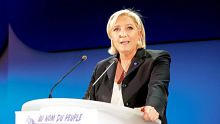Beijing: Chinese President Xi Jinping has told his US counterpart Donald Trump that Beijing opposes any action on the Korean Peninsula that goes against UN Security Council resolutions.
The phone call between the two leaders came as Chinese media reported on a rift between Beijing and Pyongyang, with North Korean state media criticising China as "dancing to the tune of the US".
More World News Videos
North Korea: from ceasefire to nuclear threats
How a ceasefire signed more than six decades ago has failed to deliver stable peace and allowed nuclear tensions to escalate.
Mr Trump held separate telephone conversations with Mr Xi and Japanese Prime Minister Shinzo Abe on Monday as tension grew on the Korean Peninsula ahead of the 85th anniversary of North Korea's military on Tuesday, which could prompt a new nuclear test.
Mr Abe said he had "high regard for President Trump's ability to use actions and words to show that all options are on the table", Japanese media reported.
Japan will join naval exercises with the US aircraft carrier USS Carl Vinson, he said.
The US has repeatedly urged China to use its economic clout to put pressure on North Korea to abandon its nuclear program, warning that if China cannot produce a solution, the US may act alone.
Mr Xi told Mr Trump the international situation was changing rapidly and it was important the US and China maintain close contact, Chinese state media reported.
"Xi Jinping stressed that China is firmly against any behaviours that violate the UN Security Council's resolution, at the same time it hopes all parties concerned maintain restraint, avoid doing anything intensifying the peninsula situation," CCTV reported.

He said the parties should "move toward the same direction".
According to the White House, Mr Trump criticised North Korea's "continued belligerence".

"The two leaders reaffirmed the urgency of the threat posed by North Korea's missile and nuclear programs, and are committed to strengthen coordination in achieving the denuclearization of the Korean Peninsula," the White House said.
On April 25, the nuclear envoys of Japan, South Korea and the US will meet to focus on North Korea's nuclear program.

In a sign that China's recent move to block coal exports from North Korea was biting, North Korea's news agency KCNA on Friday warned Beijing that it would face catastrophic consequences in its relations with the Democratic People's Republic of Korea if it continued economic sanctions.
Chinese state media, including the Global Times and CCTV, hit back and said that there would be no change in Beijing's tougher new approach to North Korea, and that oil sanctions were likely.

Asked about the North Korean media attack, a Chinese Foreign Ministry spokesman said: "China's position is consistent and clear and the relevant party should be very clear about that."
Chinese experts are saying cutting oil would be the toughest sanction China could impose - it was last done in 2003 for just three days.
North Korea's mining industry would be severely hit if China cut energy supply to the regime.
The front page of North Korea's Rodong Sinmun newspaper on Monday praised the DPRK's mining industry as self-reliant, exceeding capacity and "smashing the enemies' sanctions".
Kim Jong-un sent congratulations to a magnesite mine - a mineral that is exempt from UN sanctions. North Korea has the world's second largest deposits of magnesite, a raw material listed as "critical" by the US and the European Union and a key component in smartphones and aircraft. China has the world's largest deposits.
Leonid Petrov, an ANU fellow, says China is buying other rare earth minerals that are vital for high-technology products at half price from North Korea. He says if relations between Pyongyang and Beijing continue to deteriorate, Pyongyang could cut off sales to China and find new export markets elsewhere.
"If China falls out with North Korea, then Russia will step in. North Korea allows China and Russia to compete for concessions and ports and fishing," he said.

















